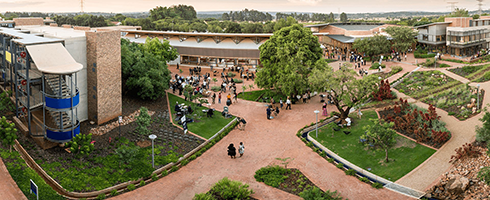Sustainability Transformations in Africa
Future Africa is actively involved in a number of activities to advance African research leadership in the domain of Sustainability Transformations, with a new Future Africa Research Chair to be appointed in 2024. In addition to developing new transformative research initiatives, the Chair will oversee Future Africa’s role in major international initiatives such as Future Earth, and the World Climate Research Programme, and secure synergies with the work of the University’s Centre for the Advancement of Scholarship on the UNESCO BRIDGES environmental humanities Coalition, as well as the Albert Luthuli Leadership Institute on the Sustainable Development Solutions Network. In addition, the Chair will contribute to a Sustainability PhD Global Collaborative Platform co-led by Future Africa (on behalf of the University of Pretoria) and the University of Montpellier in France.

Research Chair: Sustainability Transformations
Prof Maano Ramutsindela
Future Africa

Future Africa introduces new cohort of research fellows from 10 African countries
Future Africa at the University of Pretoria introduces 22 outstanding early-career researchers as the second cohort of the FAR-LeaF Fellowship. Supported by the Carnegie Corporation of New York, the programme builds research leadership, collaboration and transdisciplinary skills to address Africa’s most complex sustainability challenges.
New Future Africa learning lab reimagines people–nature relations in Africa
Future Africa has launched the African Political Ecologies Learning Lab, creating a space for African scholars to explore people–nature relations and strengthen locally grounded sustainability research. Interested researchers can contact
Land, loss and legacy: can South Africa’s natural heritage ever be shared?
South Africa’s landscapes are breathtaking, but can they ever be truly shared? In this opinion piece, Future Africa’s Prof Maano Ramutsindela and Dr Clarietta Chagwiza reflect on how colonial legacies, conservation practices and land reform shape our relationship with nature, and what it will take to make heritage a collective good.
The Tomato Paradox: When abundance meets shortage in Africa’s food systems
Marking World Food Day 2025, Dr Ololade Abdulrahman, a Research Fellow in the Future Africa Research Leadership Fellowship programme, examines Nigeria’s “Tomato Paradox” and calls for innovation to strengthen Africa’s agrifood systems.
Future Africa hosts symposium to welcome new FAR-LeaF cohort
A week-long symposium at Future Africa brought together 22 postdoctoral fellows from 10 African countries to launch the second cohort of the FAR-LeaF fellowship, fostering leadership, collaboration, and new research networks.